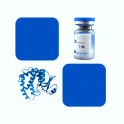
- Remove this product from my favorite's list.
- Add this product to my list of favorites.
Products
Viewed products
Newsletter
 |  |  |  |  |  |

Background
Fatty acid-binding protein 1 (FABP1) is also known as Fatty acid-binding protein, liver (FABPL), Liver-type fatty acid-binding protein (L-FABP). FABP1 / FABPL belongs to the calycin superfamily and Fatty-acid binding protein (FABP) family. Fatty acid binding proteins are a family of small, highly conserved, cytoplasmic proteins that bind long-chain fatty acids and other hydrophobic ligands. FABP1 / L-FABP binds free fatty acids and their coenzyme A derivatives, bilirubin, and some other small molecules in the cytoplasm. FABP-1 may be involved in intracellular lipid transport.
Source
Recombinant Human FABP1, His Tag (FA1-H5148) is expressed from E.coli cells. It contains AA Ser 2 - Ile 127 (Accession # NP_001434).
Predicted N-terminus: Met
Molecular Characterization
This protein carries a polyhistidine tag at the N-terminus.
The protein has a calculated MW of 15.0 kDa. The protein migrates as 15-16 kDa under reducing (R) condition (SDS-PAGE).
Endotoxin
Less than 1.0 EU per μg by the LAL method.
Purity
>95% as determined by SDS-PAGE.
Formulation
Lyophilized from 0.22 μm filtered solution in PBS, pH7.4. Normally trehalose is added as protectant before lyophilization.
Reconstitution
See Certificate of Analysis for reconstitution instructions and specific concentrations.
For best performance, we strongly recommend you to follow the reconstitution protocol provided in the CoA.
Storage
For long term storage, the product should be stored at lyophilized state at -20°C or lower.
Please avoid repeated freeze-thaw cycles.
This product is stable after storage at:
-20°C to -70°C for 12 months in lyophilized state;
-70°C for 3 months under sterile conditions after reconstitution.
(1) "Millet Bran Protein Hydrolysate Displays the Anti-non-alcoholic Fatty Liver Disease Effect via Activating Peroxisome Proliferator-Activated Receptor γ to Restrain Fatty Acid Uptake"
Shan, Zhou, Yin et al
J Agric Food Chem (2023)
(2) "Glomerular expression and urinary excretion of fatty acid-binding protein 4 in IgA nephropathy"
Tanaka, Moniwa, Nogi et al
J Nephrol (2023)
(3) "Associations of ANGPTL6, DOCK6, FABP1, and PCSK9 single nucleotide variants and hypercholesterolemia in the Polish population: a cross-sectional study"
Świderska, Mostowska, Skrypnik et al
Pol Arch Intern Med (2023)
Showing 1-3 of 860 papers.
Follow us